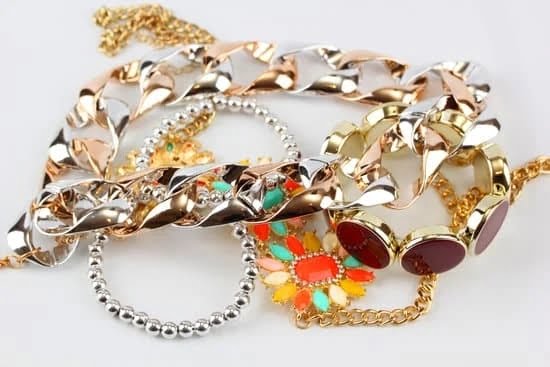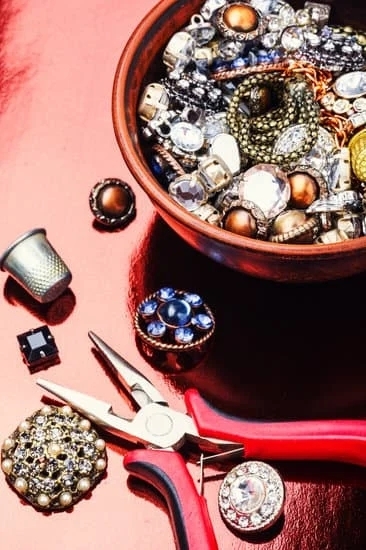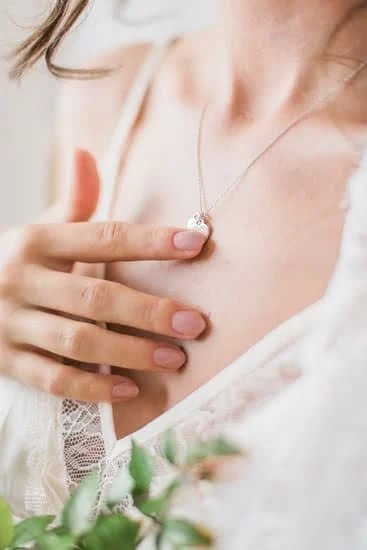Introduction
Attending antique jewelry auctions is a great way to find unique, one-of-a-kind pieces that can add value to your collection. There are many benefits to attending an antique jewelry auction, including the opportunity to view rare items and get access to a wide variety of styles from different eras. Additionally, these auctions can be a fun and exciting experience as they provide an environment where bidders can socialize and share experiences or knowledge about antique jewelry. Furthermore, compared to other types of buying opportunities, those who attend antique jewelry auctions have the assurance that the vintage pieces purchased are authentic and in good condition, as they are inspected by qualified experts before they enter the auction. Finally, with various bidding options such as absentee bids and live online bidding, even those who cannot physically attend can participate in these events.
What to Look for When Shopping Antique Jewelry
When it comes to shopping for antique jewelry, knowing the key terminology is important. The four Cs — color, clarity, cut, and carat weight — refer to the properties of certain precious stones such as diamonds. Color refers to the shade of a precious stone or metal; clarity is how clear a stone is; cut describes the shape of a stone; and carat weight is how much the stone weights in comparison to other stones. Unique characteristics like patina are also important when considering antique pieces. Patina refers to the ‘aging’ that has naturally taken place on the piece over time due to natural oxidation and gives an overall look of increased value and character
It’s a Bidding War
Antique jewelry auctions can be both exciting and intimidating. There is nothing quite like being involved in a bidding war over a one-of-a-kind piece of jewelry that someone has lovingly taken care of for many years. But how do you ensure you come out on top? Here are some guidelines to help you get the best deal at an antique jewelry auction:
1. Do your research ahead of time so you know what type of piece would fit into your collection or wardrobe best, and get familiar with the antique appraisal process. Ensure that you understand any policies regarding buyer’s premium, minimum bids, bid increments, etc. Knowing what types of condition issues to look for can also make it easier for you to assess the value on a particular piece.
2. Plan to attend the entire auction; set aside enough time beforehand to review all the lots (the items up for sale) and ask any questions that might arise. This can give you an edge when it comes time to bid – if there are any unique or rare pieces that haven’t been noticed by other bidders, you’ll be ready to pounce!
3. Make sure you have proper documentation needed in order to bid, such as proof of identity and a valid credit card or bank account information if placing an absentee bid. If using an online platform such as eBay Live Auctions, also be sure you understand how the bidding process works (i.e., making maximum bids where applicable).
4. Consider hiring an appraiser prior to bidding on a particularly expensive lot; this will give you peace of mind that your investment is sound before committing yourself financially. Finally, set a realistic budget prior to participating in an auction – once the adrenaline takes over it can be difficult not to bite off more than one can chew!
Get the Most Bang for Your Buck
Making investments is always a tricky process, and investing in antique jewelry can be especially difficult. Taking part in an auction can seem daunting, but you may end up making the best investment of your life if you approach it the right way. Here are some tips for getting the most bang for your buck at an antique jewelry auction:
1. Research Everything: Do thorough research beforehand on the pieces you’re interested in, so that you know what to look out for when it comes to quality. Try to unravel any mysteries regarding how old a piece is and its origin as these can impact its value.
2. Compare Prices: Once you have fully researched each piece, compare prices online to see what similar items are currently worth on the market. This will give you an idea of how much money to set aside before bidding begins, allowing you to maximize your ROI (Return On Investment).
3. Inspect Items: It is essential that you inspect all items carefully before bidding starts, paying close attention to condition and marks of authenticity such as stamps or hallmarks. Make sure to note down any flaws that could affect the value of each piece so that you can factor this into your initial bid or offer later on during negotiations with a dealer or collector outside of the sale itself.
4. Talk To Dealers: Finally, attending an auction is also a great opportunity for networking with dealers and other collectors who might be looking for similar pieces and willing to make an offer at or after the sale itself – a great way of maximizing your investment by ensuring each sale serves dual purposes!
Scammers
Scammers may be lurking at antique jewelry auctions and attempting to deceive unsuspecting buyers. It is important for collectors to be aware of the risks and learn how to spot a dishonest auctioneer. Here are some tips for protecting yourself when shopping for antique jewelry at auctions:
1.Research the dealer before attending the auction- Before participating in any online or live auction for vintage jewelry, thoroughly research the dealer hosting the event. Learn as much as possible about their reputation among past customers and see if any complaints have been filed against them. Also inquire with knowledgeable people in the field if they have ever dealt with this auctioneer in the past.
2. Read all fine print- Before bidding on a particular item, it’s wise to read all of the details of the sale beforehand, including payment terms and other applicable auction rules or restrictions. Be sure that all paperwork is signed appropriately before making a final purchase.
3. Identify restoration work- Although some restoration efforts are necessary to maintain an antique piece in perfect condition, dishonest dealers may hide any major repairs or refurbishing efforts from buyers. Whenever possible, seek out an expert opinion on whether certain wear and tear has been caused naturally over time or if it has recently been manipulated by a third party.
4. Inquire about returns- If an uneducated bid wins you an item that does not meet your expectations upon receipt, consider doing further research into the return policy of that particular auction house prior to bidding again next time around. Most reputable companies will provide generous return policies so long as specific criteria are met (for instance, items must typically be returned within 30 days).
5. Get insurance- For higher valued items, insure whatever goods you bring home from a jeweler’s auction either through your own insurance policy or through one offered by the seller themselves if feasible in order to cover potential damages or irreparable defects due to unseen circumstances during transit after purchase or in case fraudulent activity takes place following your initial inspection during sale day itself (such as switching out pieces after you’ve already won an item bid).
Critical Steps to Check Before Purchasing an Antique Jewelry Piece
1. Check the Reputation of the Seller: Before investing in antique jewelry it is important to check the reputation of the seller. The seller’s experience should be verified and additional information such as customer reviews, positive feedback and a good rating should be taken into consideration.
2. Get a Certified Appraisal: Obtaining a certified appraisal is paramount when purchasing antique jewelry. A professional expert can help properly evaluate its worth and verify that the piece is an authentic antique or vintage item.
3. Consider Quality Assurance: Quality assurance should always be checked prior to an auction purchase. Details such as carat weight, cut, and color will help properly evaluate the quality of a gemstone or diamond to ensure you are getting the most out of your investment.
4. Inspect All Documentation: It is also important to closely inspect all documentation that comes with an antique jewelry purchase if any exists- this includes any kind of provenance or certificates of authenticity which can confirm details about ownership history as well as maker’s marks and hallmarks found on gold or silver pieces signifying from where they were originally crafted from . Furthermore, inspecting receipts from past procedures, repairs and restorations will provide proof for insurance purposes for future use if needed.
Tales of Triumph
Antique jewelry auctions can be a great way for collectors to add some stunning pieces to their collection. While auctions for rare and vintage jewelry can sometimes be intimidating ventures, the rewards are often worthwhile. There is a growing trend of individuals having success at antique jewelry auctions—stories that read like tales of triumph and determination.
For example, George Watson, a resident of Boston, Massachusetts, stumbled across an incredibly valuable brooch while browsing through his local auction house. After putting in an offer of $5,000 he was pleasantly surprised when the highest bidder barely exceeded his own bid by only $25! Just like that, Watson had established himself as the new owner of a unique and highly valuable antique piece.
Likewise, Kristy Johnson’s success story takes place on the other side of the country in Vancouver, British Columbia. She scored an amazing deal on a Victorian sapphire ring during an online eBay auction after coming out as one of five bidders in competition for it. Initially valued at $2,000 USD pre-auction, Johnson wrangled it away with just under $1,000 Canadian dollars!
These successful examples demonstrate how anyone who is willing to put focus and dedication into researching antiques has potential to reap great rewards at antique jewelry auctions.
Conclusion
When it comes to navigating antique jewelry auctions, the process can often be a bit overwhelming. Before attending an auction, it is important to thoroughly research the auction house and event before taking part in the bidding process. Additionally, those who attend should come prepared with an accurate budget in mind and know their limits before placing a bid. Collectors should also take into account any applicable taxes or fees associated with the item’s purchase and make sure that these are factored into the overall budget. Doing so will ensure that collectors maintain control of their spending at all times. When collecting antique jewelry from an auction, it’s also wise to consult third-party professionals such as experts in diamond grading or jewelry repair technicians prior to investing in pieces that require more specialized knowledge. By being adequately informed before attending a live event, participants can feel much more confident when placing bids and experience optimal outcomes at antique jewelry auctions.

Welcome to my jewelry blog! My name is Sarah and I am the owner of this blog.
I love making jewelry and sharing my creations with others.
So whether you’re someone who loves wearing jewelry yourself or simply enjoys learning about it, be sure to check out my blog for insightful posts on everything related to this exciting topic!





